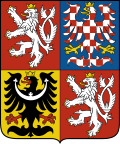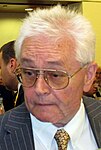
Czechoslovakia was a landlocked country in Central Europe, created in 1918, when it declared its independence from Austria-Hungary. In 1938, after the Munich Agreement, the Sudetenland became part of Nazi Germany, while the country lost further territories to Hungary and Poland. Between 1939 and 1945, the state ceased to exist, as Slovakia proclaimed its independence and Carpathian Ruthenia became part of Hungary, while the German Protectorate of Bohemia and Moravia was proclaimed in the remainder of the Czech Lands. In 1939, after the outbreak of World War II, former Czechoslovak President Edvard Beneš formed a government-in-exile and sought recognition from the Allies.
Politics of Slovakia takes place in a framework of a parliamentary representative democratic republic, with a multi-party system. Legislative power is vested in the parliament and it can be exercised in some cases also by the government or directly by citizens.
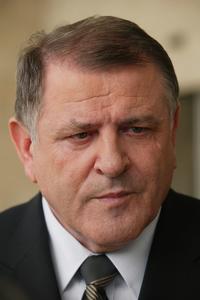
Vladimír Mečiar is a Slovak former politician who served as the prime minister of Slovakia from June 1990 to May 1991, June 1992 to March 1994, and again from December 1994 to October 1998. He was the leader of the Movement for a Democratic Slovakia (HZDS), a populist party in Slovakia.
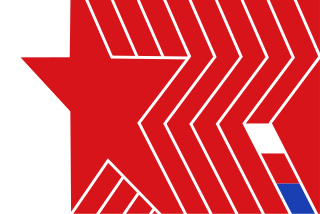
The Communist Party of Bohemia and Moravia is a communist party in the Czech Republic. As of 2022, KSČM has a membership of 20,450. Sources variously describe the party as either left-wing or far-left on the political spectrum. It is one of the few former ruling parties in post-Communist Central Eastern Europe to have not dropped the Communist title from its name, although it has changed its party program to adhere to laws adopted after 1989. It was previously a member party of The Left in the European Parliament – GUE/NGL in the European Parliament, and an observer member of the European Left Party, but is now unaffiliated.

Social Democracy, known as the Czech Social Democratic Party until 10 June 2023, is a social-democratic political party in the Czech Republic. Sitting on the centre-left of the political spectrum and holding pro-European views, it is a member of the Party of European Socialists, the Socialist International, and the Progressive Alliance. Masaryk Democratic Academy is the party-affiliated's think tank.

The Rally for the Republic – Republican Party of Czechoslovakia is a minor political party in the Czech Republic, strongly opposed to the EU, NATO and immigration. The party and its leader Miroslav Sládek are particularly known for their radical attitudes towards Roma people (antiziganism) and Germans.
This article gives an overview of liberalism in the Czech Republic. It is limited to liberal parties with substantial support, mainly proved by having had a representation in parliament. The sign ⇒ denotes another party in that scheme. For inclusion in this scheme it is not necessary that parties label themselves as a liberal party.
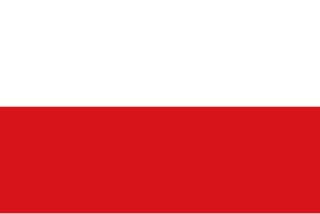
The Czech Socialist Republic was a republic within the Czechoslovak Socialist Republic. The name was used from 1 January 1969 to November 1989, when the previously unitary Czechoslovak state changed into a federation. From 1990 to 1992, the Czech Republic existed as a federal subject within the Czech and Slovak Federative Republic, and later became the independent Czech Republic.
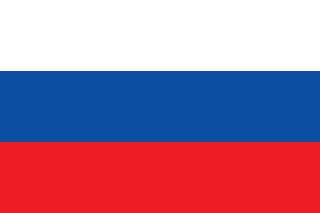
The Slovak Socialist Republic was a republic within the Czechoslovak Socialist Republic from 1969 to 1990, when the previously unitary Czechoslovak state changed into a federation. The name was used from 1 January 1969 until November 1989. The Slovak Republic was, from 1990 to 1992, a republic within the Czech and Slovak Federative Republic, that is now the independent Slovakia.

The Federal Assembly was the highest organ of state power of Czechoslovakia from 1 January 1969 until the amendment of the state constitution on 23 April 1990. From 23 April 1990 until the dissolution of Czechoslovakia on 31 December 1992, it functioned as the state's federal legislature.
Parliamentary elections were held in Czechoslovakia on 26 May 1946. The Communist Party of Czechoslovakia emerged as the largest party, winning 114 of the 300 seats with 38% of the vote. The Communist vote share was higher than any party had ever achieved in a Czechoslovak parliamentary election; previously, no party had ever won more than 25%. Voter turnout was 94%. The national results also determined the composition of the Slovak National Council and local committees.

Ján Čarnogurský is a Slovak former politician, who served as the prime minister of Slovakia (1991–1992) and the former chairman of the Christian Democratic Movement (1990–2000). Today he is chairman of Slovak-Russian association with headquarters in Bratislava.

Parliamentary elections were held in the Czech Republic on 19 and 20 June 1998. The Czech Social Democratic Party emerged as the largest party, winning 74 of the 200 seats. Voter turnout was 73.9%.

The Party for the Open Society is a minor social liberal political party in the Czech Republic.

Miroslav Sládek is a Czech politician, and the founder and chairman of the right-wing populist Rally for the Republic – Republican Party of Czechoslovakia (SPR-RSČ). Founded in 1990, the party was disbanded in 2001, and re-established in 2016.

Elections were held on municipal, provincial, republican and federal levels in Yugoslavia from its foundation in 1918 throughout its breakup in 1992.
The Jewish Party was a political party of the First Czechoslovak Republic. It was founded in 1919 by the Jewish National Council in Prague. It was the strongest Jewish political party in the interwar Czechoslovakia although many Jews were rather active in non-Jewish parties, be they Czech, German or Hungarian. The party adopted a Zionist political program and succeeded in influencing the Czechoslovak government to acknowledge Jews as an official national minority in the constitution of 1920.

The Christian Democratic Party was a Christian-democratic political party in the Czech Republic, functional between 1990 and 1996. Its first chairman was Václav Benda, the last chairman from 1993-1996 the former Minister of Education Ivan Pilip.
The Christian and Democratic Union was a political alliance in Czechoslovakia.

In Czechoslovakia the first parliamentary elections to the National Assembly were held in 1920, two years after the country came into existence. They followed the adoption of the 1920 constitution. Prior to the elections, a legislature had been formed under the name Revolutionary National Assembly, composed of the Czech deputies elected in 1911 in Cisleithania, Slovak deputies elected in Hungary in 1910 and other co-opted deputies.

